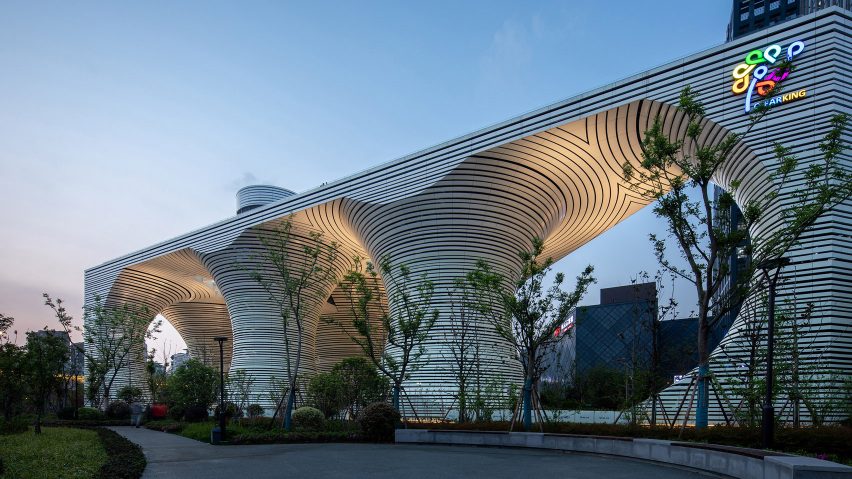Architecture firm Daniel Statham Studio has designed a vertical car park in central Hangzhou, China, where cars are stacked using a fully automated lift system.
Named Future Car Park, the building is located in the city's central business district and has a capacity of 500 cars.
"Future Car Park invents a new way people commute to urban hubs, while creating an urban oasis that is a synthesis of the latest automated parking technologies, public space, event spaces and hanging gardens for the public," the studio said.
The car park is comprised of a series of circular towers that grow upwards and expand into a connected roof.
Three circular towers at the centre of the Future Car Park are used for stacking cars, while three others transport visitors from ground level to the rooftop via an internal lift system.
An additional four orthogonal towers, located on the corners of the site, contain fire escapes.
The car park is equipped with an advanced automated parking system, which covers the entire parking journey, from drop-off to parking and pick-up.
Cars are driven into the building at the basement level, where people and cars are separated into different towers. The cars are then either taken to lower parking zones within the basement or stacked in the towers via the lifts.
A designated parking spot is selected for each car by the automated parking system, based on the required parking time set by the owner of the car. The system then continuously adjusts the parking arrangements as the estimated pick-up time approaches.
"We have attempted to combine and celebrate automotive technologies in both its vehicular and parked form, in its ever-evolving sustainable pursuit and house it as 'art within the architecture'," lead architect Daniel Statham said.
"It is a celebration of 'man and machine' in a space for the future city that makes a statement to create a healthier and more sustainable environment for all," he continued.
Metal louvres clad the car park's facade, creating a see-through effect that gives passersby a glimpse of the automated parking system within the towers.
The porous cladding also lets light into the building and acts as a natural ventilation system.
"The car park not only ventilates any car fumes from non-electric vehicles around the basement edge via the ramping system but also deep within the floor plan using the 'towers' as a kind of 21st-century chimney," the studio said.
It claims that this also reduces the mechanical equipment needed to heat and cool the building.
The shape of the Future Car Park towers means they function like "a canopy of trees", the studio said, providing shade and shelter for the plaza under it, which also connects to nearby parkland.
A rooftop garden and viewing platforms on top of the building aim to provide social spaces for the public and will house events and exhibitions overlooking the city.
Daniel Statham Studio was founded in 2007 and has offices in London and Shanghai.
More car park designs include MoLo by Chinese studio MAD in Milan featuring plants and polished-metal staircases, as well as a prefabricated multi-storey car park in Montevideo, Uruguay, topped by a courtyard garden and rooftop terrace.
The photography is by RAWVISION studio unless otherwise stated.
Project credits:
Area: 30,740 sqm
Lead architect: Daniel Statham
Local design institute: Zhejiang Province Institute of Architectural Design and Research
Engineering: Atelier One, Zhejiang Province Institute of Architectural Design and Research

